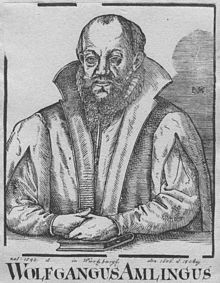Wolfgang Amling
Wolfgang Amling, also Wolfgang Ambling , pseudonym: Theophilus Evodius , (* March 8, 1542 in Münnerstadt ; † May 18, 1606 in Zerbst ) was a Reformed theologian and denominationalist in the Principality of Anhalt .
Life
Amling was born as the son of the wool weaver , council member and later mayor and his wife Maria Gesner. After finishing school in his home town and Schulpforta , he studied in Jena , Tübingen and Wittenberg . After he had obtained his master's degree, he became principal of the school in Zerbst in 1566. In 1569 he fought against the reintroduction of the Catholic faith and then became pastor in Coswig (Anhalt) , in 1573 pastor to St. Nikolai in Zerbst and in 1578 superintendent of the Anhalt regional church . In 1604 he disputed with the Lutheran theologian Albertus Grauerus at Schochwitz Castle .
As superintendent, he made a major contribution to ensuring that the Reformed Confession achieved a breakthrough. He also ensured that Anhalt theologians received their training at the Zerbster Gymnasium Illustre . Theologically he pursued the independence of the Anhalt Church, led ordinations in Zerbst and tried to move away from the formula of concord. As the successor of Abraham Ulrich , he changed the once Lutheran-oriented Anhalt Church into a Reformed Church according to the views of the Philippists . Which conception was interpreted by the Lutheran theologians as the theological orientation of Calvinism .
Amling was married twice. His first marriage was in 1566 with Dorothea Krebs. After her death (1571) he married Barbara Neuendorfer († 1601) in 1572.
The lawyer Wolfgang Amling jun. (* July 14, 1569 in Zerbst; † July 8, 1613 there) was his son.
Selection of works
- Confessio Anhaldina , 1578
literature
- Heinrich Heppe : Amling, Wolfgang . In: Allgemeine Deutsche Biographie (ADB). Volume 1, Duncker & Humblot, Leipzig 1875, p. 399 f.
- Franz Lau : Amling, Wolfgang. In: New German Biography (NDB). Volume 1, Duncker & Humblot, Berlin 1953, ISBN 3-428-00182-6 , p. 249 ( digitized version ).
- Friedrich Wilhelm Bautz : AMLING, Wolfgang. In: Biographisch-Bibliographisches Kirchenlexikon (BBKL). Volume 1, Bautz, Hamm 1975. 2nd, unchanged edition Hamm 1990, ISBN 3-88309-013-1 , Sp. 145-146.
- Joachim Castan: Higher Education and Reformed Confessionalization. The Illustre Gymnasium of the Principality of Anhalt in Zerbst, 1582–1652. Mitteldeutscher Verlag, Halle 1999 (= Studies on State History, Volume 2) [About Amling, from p. 42]
- Gustav Plitt : Amling, Wolfgang. In: Real Encyclopedia for Protestant Theology and Church (RE) Volume 1, 1896, p. 449
- Johann Gottlob Wilhelm Dunkel: Historically critical news from deceased scholars and their writings. Köthen 1755, Volume 2, pp. 11-17 ( digitized version )
Web links
- Amling, Wolfgang. In: Johann Heinrich Zedler : Large complete universal lexicon of all sciences and arts . Volume 1, Leipzig 1732, column 1743 f.
| personal data | |
|---|---|
| SURNAME | Amling, Wolfgang |
| ALTERNATIVE NAMES | Ambling, Wolfgang; Evodius, Theophilus (pseudonym) |
| BRIEF DESCRIPTION | German Reformed theologian and confessionalist |
| DATE OF BIRTH | March 8, 1542 |
| PLACE OF BIRTH | Münnerstadt |
| DATE OF DEATH | May 18, 1606 |
| Place of death | Zerbst |
